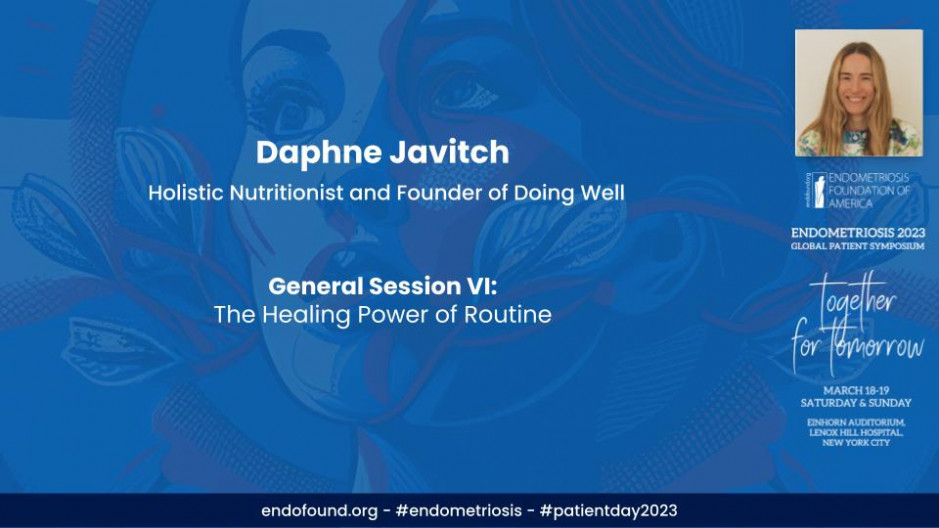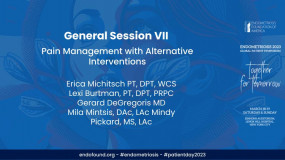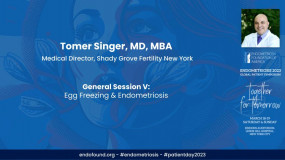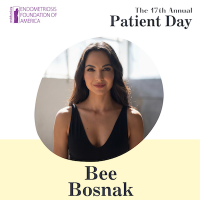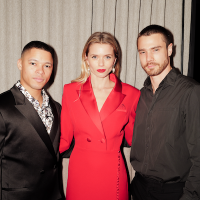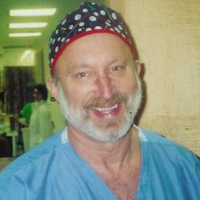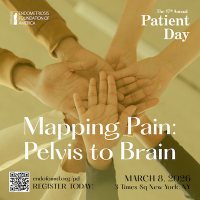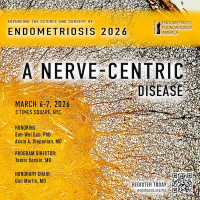Endometriosis 2023:
Global Patient Symposium
Together for Tomorrow
March 18-19, 2023 - Einhorn Auditorium, Lenox Hill Hospital, NYC
Okay. I just have to, can you hear me? I'm very analog, so, um, I'm so excited to be here. I'm so grateful to be here. Um, I just have to ground down for a second because this is so meaningful to me. Um, thank you, Dr. Sukin and Dr. Goldstein. I just wanna say that about in 2014, I didn't do the math, but it's about eight years ago, nine years ago maybe. Um, when I really began my overt endometriosis journey, I'd had symptoms since I was 13, but it was becoming clear and clearer that I had endometriosis. Um, very few doctors, I'm a health coach, by the way. Let me back up. Hey, I'm Daphne. I'm a health coach. Um, very few medical doctors were interested in the, uh, alternative or integrative or holistic, uh, things that helped me go into remission. So, to stand here, uh, in the company of so many accomplished, important doctors and people in the field is such progress.
It's so important that we all come together and address this from every angle and work together to, um, find out more, learn more, and make life more livable with this condition. So it's such an honor, and also, I just wanna acknowledge everyone who's here because it's such a commitment, um, that can be exciting and also very arduous to advocate for your own health. And I just wanna acknowledge everyone who's here doing that. It's so important and it's also equally as optimistic. So, okay. Um, I wanted to tell you a little bit about my story, and then today I do wanna talk about how we can use routine as a tool for healing. Um, and we'll talk a little bit about what do I mean by that and, um, some core principles that assist establishing and practicing routine. And then I wanted to give some really kind of concrete examples of how to begin this immediately tonight or tomorrow.
But before I do, I wanted to tell you a little bit about my story and how I came to, um, working as a coach. Um, I experienced debilitating pain since the age of 13. Um, on my period to the point where sometimes I couldn't go to school, sometimes I walked like this. Um, I would take up to 12 Advil on the worst day of my period, I took muscle and I thought that this was normal. I thought that this was having a period. Um, and when I was 2004, I didn't know I was gonna have to do so much math, like we just had to do math about the timing. So I, I'm not good at doing math on the spot. Uh, but anyway, in 2014, I was around 34 years old. I was hospitalized when it turned out that assists had ruptured on my ovary.
And several more ovaries were discovered, um, in the emergency room, and they speculated. And after getting more imaging done, kind of assumed that it was endometriosis. And at the time, I was advised to have immediate surgery and go directly on birth control. And I had just started working with a holistic nutritionist. And so I honestly, by the grace of God, not that I chose to do that, but that I took a second, because sometimes that's the hardest part. Just taking a second when we're getting so much information and really understanding that we don't have to make a decision in the room. We don't have to make a decision that day. We can really take our time. And by the grace of God, I had one of those moments and I decided, you know what? I'm gonna consider the surgery, I'm gonna consider the pharmaceuticals, but first I'm gonna approach this from a more, um, holistic integrative, uh, space, which was really focused in diet and nutrition, and I really am, I really went for it.
Uh, and so for six months, I really committed to quite a rigorous, what I would now call healing lifestyle. Um, and within six months, most of my symptoms were in remission. So, um, I had gone, I'm gonna use some examples of what I mean by that, but I do wanna be really clear to say that we should never, I'm not saying this to be like my symptoms, were in remission. It's more like, just to give you some concrete examples of what I experienced and for everyone, that's gonna be a different thing, right? But like I said, I was taking up to 12 Advil a day on my period. I had digestive issues, I a lot of gas. Um, I had, um, depression because we all know, most of us know, um, that it's, it's discouraging to move through chronic disease, right? And, uh, so I was taking one Advil my whole cycle.
I was not in digestive distress, I was feeling optimistic. And, um, this really turned on a lot of light bulbs for me because previously I had been working in fashion and my approach to health was really, I'm shy to say it, but I just want to be totally frank and transparent. But my approach to health was really from an external, um, uh, perspective, A looks perspective, and going through this experience and having the, the real like privilege and also the kind of integration moment to realize that my body really wants to heal. My body is there for me, my body is, this is gonna sound hokey pokey maybe, but it's an exquisite, I believe this, it's exquisite, it's perfect. Um, and that it's striving to be that way, right? And so it really shifted. I I had a real shift. And so I got very interested in why did this happen and how did this happen?
And I started studying and pretty soon I was like, this is kind of what I'm doing all day. So I'm, I'm, I think I'm gonna shift from what I'm doing now and start, I wanna make this teachable. I wanna share the things that helped me and make it teachable and work with other people. And that's sort of how I transitioned into having a private practice working with people who have endometriosis, but many health conditions including anxiety and depression and eating disorders and all sorts of chronic conditions. And, um, and that's sort of my story. I just wanted to contextualize maybe like why I'm here <laugh>, um, and how I can relate to the, the journey and the, the process. Um, so, you know, in the beginning when I first started working with people, so much of my work was about food and what we should eat.
And it was kind of a little bit, I'll say, uh, I'd say looking back more instructional. And what I realized over time is yes, food is very important, um, much because of the fact that we have so many opportunities throughout the day, and we have so much, we have certain amount of agency over it. So it's like, it is an important factor. But what I realize is that so many people really do know what to do, but we don't have the support and the guidance and the partnership, the witnessing and the, the, the guidance truly of how to do these things, right? And so I started to think about, you know, my approach in a different way. And so much of my approach is guided by the very real belief that I have, that we are all designed to express health. We're naturally designed to express health.
Think about when you get a paper cut, um, you don't do anything and it heals, right? And, and that's just a microcosm of what our body is always doing, right? And the thing is, is that that is our natural design, but we don't live in a natural world at all. If you think about how much of our lives are natural, especially in a place like New York or any city, or really anywhere, very little. So the fact that many of us are struggling to express health has nothing to do with a lot of the reasons that we carry or that we project onto others, right? It has so much more to do with navigating all of this toxic burden. And I want to be clear, I don't mean toxic burden, like, ooh, toxins, you know what I mean? I mean that it is a toxic burden to, I mean, I think everyone knows what I mean, because it's like, think just about, yes, there's food, there's toxicity, there's pesticides, et cetera.
There's environmental toxicity. We are, we, we know that there are environmental toxins, but toxic stress is such a burden on our immune system and our sense of wellbeing and our ability to move forward every day. And that could be covid, that could be financial, that could be personal, but that's also the voice inside of our head, evaluating or feeling guilty or shameful because of, you know, our body's challenge to express health, right? So I started to think a lot about flow and how important it is to really emphasize and encourage flow. And what I mean by that is like flow through the body, digestive flow, circulation. I'm gonna get into it if I don't take too long with this beginning part. Um, and lymphatic flow and energetic and emotional flow. But really what ended up becoming my specialty is establishing and practicing routine. Um, you could even say that it's my kink like routine is my thing.
And that is because over the last eight years, I have not only experienced my own life, but witnessed in the life of my clients. And if anyone here has children, I have two children, I have witnessed with my children the healing power of routine and how stabilizing that can be for all of us. So I wanted to talk a little bit about that in more detail. Um, and then I, I would love to answer some questions about whatever you feel called to ask. Um, but what is a routine? A routine are actions followed regularly? So it really can be any action <laugh>. Um, it just, the regularity is what makes it a routine. It can be quite small, right? So most of us are in a lot of routine already without being aware of it, like brushing our teeth or making our bed, or you might say like the way you load the dishwasher or the dish, the drying rack or how you do certain things we're already kind of naturally in a lot of routines.
Um, and there's a misconception when we talk about, there's a few misconceptions, but I found that one of the big ones is that we feel like a routine because we tend to, especially when we're working towards healing goals, but even if not, we tend to really, um, go all or nothing, right? So we're like routine. I have to do everything like this way all the time. And I think it's kind of seen as sort of rigid and controlling, and that's really not how I think about it at all. I really think about routine as a rhythm, as something that we can rely on as something that we can return to as something really supportive that we can relax into, and also that we can abandon, right? We can abandon and then we can return to it. I'm gonna get into more detail about that. Um, and I think the other, uh, just one more thing about control.
I really don't think a routine or this routine that I'm presenting today is about this idea of things have to be a certain way and I can't be interrupted and has to be controlled. That's a very contracted feeling, right? When I think of routine, I think more about being deliberate about kind of earlier how I mentioned taking that moment, taking that space and having a more expanded and therefore a more empowered experience, right? Um, and then I think the other really big misconception about routine is that if we have a busy life or an unpredictable life, we can't have a routine. We just can't. And the truth is, is that a busy life, an unpredictable life is life, right? So we can't wait for things to be perfect or calm or organize to begin these healing practices. We have to kind of find the middle place between, um, the discipline, especially when moving through endometriosis of creating and holding space for that.
And, um, also the fluidity of it not being perfect every single time, right? So it's kind of a delicate balance. Um, I have a teacher, Mary Ruth Giam, um, she always says, structure creates freedom. And I've thought a lot about what does she mean by that? And it's, I've really noticed, especially in the past few years, I think I, I think what I interpret it to mean is when you have certain aspects of your life that are more routine oriented than areas where fluidity and spontaneity are truly valuable come into relief, and there's more clarity around, you know, what deserves that fluidity in that spontaneity. And to me, in a lot of, in, in healthy dynamics that has to do with our relationships. But um, sometimes having too much fluidity around, you know, when we eat or what we eat or our morning or our evening, can actually cause a lot of anxiety, right?
It's easier to have a little bit more clarity and consistency for calming and grounding the system. Um, so I really do think of routine as truly a source of stability and clarity and support. And that's moving us away from decision fatigue, overwhelm, negative self-talk, which if you are like me, um, I really need to redirect my attention and, and kind of turn the volume down or I needed to. And one of the ways that I did so was through establishing routine and having this kind of more, um, external thing to focus on to help move me forward even when I felt bad, right? Um, and routine can also be a real emotional scaffold. I'm gonna talk about like the routines in a second. So it's not just this abstract thing, but I kind of wanted to talk about why I think that this is so powerful and, um, it can be an emotional scaffold because it can really redirect and quiet all of those things like guilt and shame and, um, blame that we're reflexively sort of fall into as a way of controlling what's going on, I think, you know, as a way of contextualizing it.
Um, so routine can really take that from being a personality problem, whether it's our endo or our, um, wherever we feel kind of challenged or we feel like we're falling short or we have limitations, it takes it from being a personality thing and really turns it more into like a sta a space and time management thing, which is way less tender and a little bit more strategic. Um, and the other thing that I really love and I'm grateful for about having some routine in terms of our, um, lifestyle moving through chronic condition, is that it really keeps us moving forward when we're not in the mood. And I gotta say, that's gonna be a lot of times, right? Um, there are many things that I am not in the mood to do that I do on a daily basis. And I'm very blessed and grateful that I am a parent.
Actually, my first son was born in this hospital, so it's very meaningful. Um, but, you know, there are many things that we don't feel in the mood to do, but often mood follows action. But when you're not in the mood and you don't have an idea of what it is that you may or could or should be doing, it's really hard to like, choose the action to do to see if the mood follows. Does this make, was that a circle or did that make sense? Okay, so I really like this kind of easy entry point to get back to return, right? And, um, sometimes life is so hectic and priorities shift, and it's also great and necessary and important to understand that a routine can be dropped. You know, you can, you may be dealing with exceptional discomfort or a family member who needs you or an, you know, a spontaneous invitation to do something healing in another way, like connective or joyful.
And then it's perfectly wonderful to drop the routine, but then you know exactly what to return to because a routine is almost like a map back to the practice. It's an anchor. Um, it's kind of a, like a, a way to course correct without all of the emotional evaluation that honestly we wanna always be thinking, especially those of us navigating endometriosis, we wanna really be thinking about unburdening ourselves, right? Unburdening ourselves. And this is a way of unburdening ourselves of this evaluation that weighs quite heavily. Um, so I'm gonna get very specific in a second, but really you wanna identify one thing, just one thing that you can do on a daily basis, right? Whether that's, um, we're gonna talk a little bit later about drinking. I'm gonna give you my top three starter things, but it could really be, um, like I'll tell you one that I'm working on right now, which is trying to not engage with my phone from when I wake up until when my sitter comes, which is about an hour and a half to two hours.
That sounds kind of pathetic, but try it. Um, and that's kind of part of my routine and it's one thing, and we often are led to believe that we have to like, go into like the wellness witness protection program to get any like healing done. And it's actually just one thing, one thing, but there is a catch. You have to do that one thing again and again, and again and again. And I will talk about my favorite principle of all consistency in a second. But before I do, I want to talk about curiosity, because something I have found that has been so helpful is becoming curious. And what do I mean by that? I mean, can we be curious where we typically are critical, I'm just gonna say it again. Can we become curious in the spaces that were typically critical? And in this context, I'll say, I'm talking about self-criticism, but actually this is a concept that you can take into, I'm very critical.
I'm from New York, that's like part of our dna. Um, so I'm very judgmental and critical and I think it's okay to say that, but you know, but then can I become curious? Can I have a judgment? And then get curious about the judgment myself, the person. So why is this so important? Because curiosity is, um, I think I was gonna talk about anyway, whatever curiosity is kind of a criticism is like slamming a door in your face, right? Curiosity is like a path. There's somewhere to go. Criticism, not so much curiosity. Not only is there somewhere to go, but to me it's like exciting. It implies that there's something interesting happening, right? It's the ability to notice instead of just jumping to our repeated patterns or conclusions, right? And even if you thought about like curiosity personified, which I sometimes do, to me it's like, looks like a little Bambi, like a little Bambi running through the woods, you know, a playful, sort of youthful experience.
Um, and I often tell my clients, be a journalist or a scientist gathering information, not a lawyer or a judge that this is good information or this is bad information. Just gather the information. All of the information is valuable to us, right? Um, so like if you end up having like fries and martinis, which I'm probably gonna do tonight, um, you just say, oh, this is so interesting. The specimen is enjoying fries and martinis. What's going on here? Right? Like, is she stressed or is this connective? Is this, and then there's, so there's, there's so many places to go and it becomes a very like, fruitful opportunity to be in relationship, right? It's relational. A lot of times when we do something that we think is bad, which don't get me started, um, we kind of are like, la la la, la fries, martinis, la la la la.
Like it didn't happen. Um, and that is not helpful. That's not helping us understand. And then being able to put those things in a more deliberate position in our life, right? Oh my gosh. Okay. So I do wanna say a couple more things. One is about consistency, but that's my big five, right? 15. Oh, okay, perfect. Okay. So I wanted to go back to talk about consistency, which is number one most under marketed healing tool that ever existed. Okay? So it's so important to be consistent. What makes a routine a routine is the regularity. Why is consistency so important? Because consistency heals health is cumulative, okay? We live in a really fast technological world where we're used to getting things right away and we're drawn towards novelty. We wanna do extreme things and get extreme results. But those things often end in feeling like an extreme failure, right?
Health is cumulative health in the body is created through small decisions done every single day over and over and over that have a big impact, right? So that is an absolutely crucial aspect to creating routine, even if it's one little thing like my phone. Um, and practicing consistency helps to move us away from that all or nothing. You know, our body doesn't wanna be going like that. It wants to kind of be more in a little o and then the fries and the martinis are oop, and then I'm gonna go on holiday. I'm doing all good, good examples. Um, and to really remember that repetition is a form of change, right? So just because you do the same thing every day doesn't mean you'll be in the same place every day. And I'm gonna get to talking about water in a second. Try drinking a liter, two liters of water every day.
And in 10 days you're already gonna have better poops, you're gonna have more energy, you're gonna have, uh, a lot more, um, connection with your hunger levels and your cravings. I'm gonna get you in a second, but my point is, is that repetition is a form of change. It's not a stagnant experience. And the next level arrives, right? So a lot of times people think my principles are very grandma because they're not like so crazy and extreme, but the, the next level arrives, we don't grip and grasp. It's the repetition that brings us gently to the next level. This is very important for sustaining our health, right? Um, and I did wanna talk about one more concept and then I wanna give you three starter things. Um, the concept is return. So an advanced practitioner in their healing journey is not perfect all the time.
That is not what makes someone advance, what makes someone advanced is focusing on the return when things go off a little bit, which they will. That's life. That's a beautiful, rigorous, engaged, connected life, which is what we're actually going for when we're working towards health and healing, right? There's no metal. We just wanna feel a part of something meaningful, right? Connected, capable, available. So there is no falling off the wagon. There is no failing. There's only how gently how gracefully and even how good humored can I return to my routine, right? And you need a routine to do that, okay? Cuz you don't, you can't, it's so easy to spiral if you don't have one thing, like, oh, I'm gonna do the cell phone thing, I'm gonna drink the water, I'm gonna do, you know, one of these things. It's so easy to kind of be in this spiral instead of just thinking, oh, I'm always moving forward.
And my husband is from Brazil and he's a very specific driver. Um, it's a little bit, it's a, it's it's exciting. Um, and when we're driving I notice something about him cuz I always try to find the opportunity to learn. Um, and when we're getting into a shady, dangerous situation, which usually isn't him, but it's like, let's say someone's stopping short in front of us. I notice that my husband never comes to a full stop on a freeway. He'll drive into like the fr the shoulder or like, I don't know what the thing between the lanes is called. He'll do that before he'll come to a full stop. And it's really interesting and it's actually safer because stop then you get this cumulative accident if he full stops, right? So, you know, think of my husband <laugh> driving and that that idea of like, there are no full stops.
Sometimes we slow down, sometimes we change lanes. But how smoothly, how quietly, how quickly can we get back into our routine? So, okay, that's my real 10, right? Okay, perfect. Okay, so really quickly, I just wanna, I would not wanna walk away without giving some concrete examples and then I hope we have a few minutes for questions. But really suggest that you start with the morning. The morning is when we have the most agency. Typically we wake up in our home and obviously some people are shift workers and it's different, but I'm just gonna speak generally in in favor of time. Um, it's also for most people, not everyone, there are people who are more uh, nocturnal but most people have the most clarity and focus in the morning and are able to make more deliberate choices in the morning. And that has a kind of domino effect through the day.
It influences the day and we sort of wanna honor those choices throughout the day. So you've heard of a morning routine, typically it's like some, no offense, toxic male being like, I wake up at four and do this. I'm not talking about that. I'm just saying when you wake up is a beautiful time to kind of choose something deliberate to begin your day with. Um, it's also, um, it impacts the day and it's also a great tool for course correction because the day might unravel, it probably will most of ours do, right? And if it unravels, we can use the following morning as that opportunity to return. So having something in the morning is very, very powerful. And don't forget that if your mourning is healing and healthy and something positive, the morning is a third of your day. And if you do that for 10 days, for 20 days for 30 days for 300 days, that's the cumulative health that I'm talking about it.
You don't have to be perfect all day long. You choose a section and you go one decision at a time, one choice at a time, brick by brick, one meal at a time. Um, I also wanted to get a little bit more specific about these actual things. So sleep, I have clients who go to Austria and go to this like really fancy spa where they learn how to chew and great, that's awesome. But I like to tell those people that if you are not sleeping seven to eight hours every single night, you are missing out on the most luxurious cleanse detox that exists in the entire world. Okay? When we are sleeping, which by the way, they used to think and not that long ago, like 10 years ago, that sleep was a passive state. And now we've come to learn about something called the glymphatic system.
That is a system where literally our neurons take out the trash and replace neurons. Our brain takes out the tra I'm gonna talk simple terms so we can get to q and a. Our brain takes out the trash, our organs release debris, our um, mmi, which is a migrating motor complex, is a gut cleansing system that only activates when we are not eating. So that's typically our longest fasting window is our sleep. All of these systems come into play. If you've ever woken up and had bad breath or body odor or eye gunk, that's wonderful. That's your body releasing debris, right? So, um, it's very important. So I have a lot of tips for sleeping, like be in a cold room, be in a quiet room, being in a dark room and getting fresh air and sunlight if you experience insomnia is very powerful for helping us establish our natural rhythm.
And if you do have insomnia, don't focus so much on what time you fall asleep but get consistent with your wake up. So even if you're awake until 2:00 AM push to stay getting up at the same time every day. It's like jet lag. You'll start to get more into a rhythm and it's the consistency of the morning, uh, wake up that is more powerful for that insomnia. Um, the last one I want to talk about, well it will be the last one I talk about cuz of time and I wanna do questions is water. And it's truly like one of the things that I work on with clients where I feel kind of like, yeah it's just water. Like I kind of feel bad cuz it's most accessible tool for many of us. But water promotes detox, that's like the removal of microplastics. Um, that could be pesticides, heavy metals.
It improves our circulation. We wanna think of motion and movement and flow as vibrancy and longevity and accumulation and stagnation is more associated with aging and disease. Water is gonna move all that stuff. The pooping gets better, the peeing, some people find it really annoying to pee, but when you pee, all of those things I just talked about are coming out. That's a wonderful thing to pee a lot. Um, and it can reduce cravings and hunger between meals, increase our energy. And then there's also some beauty side effects like glowing skin. So you wanna aim for half your body weight in ounces. So this math I wrote down cuz I was like I don't want to be spontaneously doing math on on up here. But so for example, if you're 160 pounds, that would be 80 ounces a day. But you can also choose to do kind of like a liter, two liters.
And I suggest drinking it early in the morning. I'm good early in the morning so that you're not up all night peeing and so that you get it out of the way. So this is a really good routine for everyone to begin tomorrow is to wake up and before 12 noon, consume one liter of water and do that for 1, 2, 5, 12 days and literally email me because I want to hear what happens cuz I know stuff is gonna happen. Um, and I'm not gonna be able to have time to get into the food component, but I do wanna say you can eat your water too and that would be your leaves and your veggies and your unprocessed unpackaged unrefined foods. So we have a few minutes. Sorry I, the pace was a little imbalanced but I do wanna get to some questions if you have time questions. Doesn't have to be about routine. It can be whatever you feel first of your second.
Hi, thank you so much for your time. I love everything you said about routine. I also have children and feel the same. They thrive off routine. I love also mourning and water. What I found at a girlfriend of mine, also very into finding routine and um, what I found really helpful for me, her whole philosophy is water before coffee. She's like, do not grab that first cup of coffee, have an entire glass of water. And that just again, like kicked off the day and it echoes I think your sentiment of one small thing. So again, just echoing a lot of what you were saying and I know a lot of us can't wake up right before that cup of coffee or tea or whatever it is and it's one cup before that I thought was super helpful. And of course I'll take in all everything else you mentioned too, wanted to add that cuz again, small change. Yes,
Agree with
All of it. Thank
You. It's all about the small stuff. I wanna say one thing, which is I have two kids, two and a half and five. And at a certain point I was like whoa, I don't think I've read a book in like five years. Um, and I cannot wait for my life to open up all this reading space for me cuz I don't think that that's coming anytime soon. So after I would put my son to bed, I would go directly to a chair and I would read for 15 minutes. And some days that turned into 25 minutes and some days it was 15 minutes and it wasn't so pleasant. And I'll tell you, I finished a book. So that is what we're going for. We, me speed reading one book and like ruining everyone's life while I do it is not what is gonna be sustainable and it's what's sustainable that has an impact. Yes.
Hello. Thank you so much for your talk. It was wonderful. Um, I just have a quick question. So I love the whole idea between like, um, about routine and consistency and being persistent and whatnot, but as many of us have endo or a lot of other things going on in our lives, things pop up and it's life is pretty unpredictable. Mm-hmm. <affirmative>. Um, and I'm just curious how we should handle setbacks like that and if one day is bad, if we messed up that whole week or how to get back on track mm-hmm. <affirmative> because every day isn't gonna be the same routine. I'm
So thankful for your question. So I wanna be specific about language cuz I think it matters. I do not consider interruptions a setback. You really need, we need to kind of, I embrace this idea that those interruptions are actually just our real life happening. And so I actually have a handout because I'm literally a librarian from like 1989. Uh, I didn't do a thing, but I have a handout. And on that handout there's a checklist and all of the things on that checklist are not related to like what you're eating and how you're eating and when you're eating, they're things like, chew your food, get some direct sunlight. So on days where it's just not gonna happen, right? Those are the things we wanna focus on because those things make a big difference. The more you chew here, guess where you do a lot less work here, right?
So it's easier on the body, right? Um, also just before I get like pulled off the stage, I just wanna say in the gift bag, the, I did this a couple years ago and we got a dry brush in the gift bag and it's back in the gift bag. Um, and so the dry brush is a really good one. Um, to, to dry brush your body every day. So if a doctor's appointment comes up or you cannot get out of bed, that is not bad. That is not a setback. That is your reality today. What are the things that we can do today? I can drink a tea, I can have my water from bed, I can use the dry brush to activate some movement and circulation in the body. And so you choose the thing that you actually can return to. It is actually an adjustment to move away from this idea of like, I have to do this, this, this, this. No carbs, no this, no that. It's like, no, just put parrot with a salad. You're good. Okay. That's where we start and then that shifts. Do we have time for a few more? Yes. Okay.
Hi. Uh, first I wanna say thank you for explaining the brush. I saw it and I didn't. I so that's helpful. <laugh>, <laugh>. Um, something that I sort of heard you say that I just wanted to point out that I think is, um, that comes with routine is sort of, and you can agree or not is is sort of that frustration tolerance that you're building and you, you know, you brought it up like, you know, I'm forcing myself to read these 15 minutes and sometimes that's amazing and I love it. But then there are those other times where you kind of have to work through it. And I think there's something empowering about that agency of, I know that I'm frustrated, but I'm sort of in control of this frustration right now mm-hmm. <affirmative> and you know, practicing that even can sort of build that recognition of this thing can be frustrating. How does that show up for me? And also, you know, can I build sort of that battery for that feeling?
Yes. What I love what you said was how does that show up for me? Because what that automatically does is puts us in the position of becoming curious and as soon as we become observational, when we slightly lift and have a gentle, and I'm gonna use a word that is also, you know, it's a really important word, a friendly awareness air, honestly, we have spent so much time being really mean to ourselves, right? But if we lift up and look and we have this gentle friendly awareness, suddenly that difficulty, it's still difficult. I'm not gonna lie. It's not gonna be easy, but there's a kind of, there's a flow to it, right? How does this show up for me? What was happening in the days where the reading wasn't fun? I wanted to look at my phone. I wanted to do the 50 things that I had to do before the day begun begins tomorrow.
And so looking at that and then saying, can I experience that and take a breath and read for 15 minutes and that conversation, that right there is the relationship. And I gotta tell you, the relationship we have with ourself is very, very important to the healing journey, right? Because our cells hear what we are thinking. So we have to try to turn the volume down on the gremlin thoughts. And even, I don't even say think positive, although I think on that checklist it says positive thoughts. Let me clarify. Think neutrally forget positivity. That's like some Buddha, I don't even think Buddha, I think Buddha was more neutral. But think neutrally and notice how rare it is, how often we jump to criticize to judge, to shame ourselves, to blame ourselves or to shame or blame other people, right? So I love the, I think that's a beautiful question or contribution, which is that yeah, it's sometimes it's not gonna be pleasant. And the way we build up our endurance is also not by thinking about having to control, allowing it, observing it. That's more expansive than control. Control is like a contracted emotion. And what we're going for is kind of like more of this, a few more, two more. If there are,
Um, yes, we can take one. Let's take one more.
My time management was so bad guys. I'm sorry.
You're doing great <laugh>.
Um, I just wanted to say that I really appreciate, um, talking about routine in terms of a wellness focus because I feel like so often in our world it's like recipe for success. This is the routine you need to have or this is how millionaires start their day. And so I really appreciate that focus and it makes it feel much more attainable and relatable. And it also helps me understand, like, I've been recovering from Endosurgery fairly recently and I think one of the hardest parts about it for me was kind of that huge upheaval in my routine. And I learned like even if I couldn't get it all back at once, like those little bits of it that I could just reclaim and take comfort in was wonderful. So this very much resonates with me. I also wanted to say that I also have a Brazilian husband and he drives the same way. So <laugh>, thank you. I
Feel seen <laugh> and just on that it's like I do wanna just emphasize this idea that like, I know we live in an Instagram culture where it seems like someone's gonna like the, the better we are, the more we succeed. But like health is about being able to participate, being able to belong, being able to connect, being able to engage, being able to be of service ultimately, right? So that is what we're working towards. No one's gonna, you know, the relationships in our lives with ourselves, with our work, with our family, our partners in our community. Right. Okay. I'm really pushing it. I'm really pushing this one.
Thank you so much Daphne. Appreciate thank
You so much. Appreciate it. Thank you so much to all of you.
And that's a great segue for everyone to take a 10 minute break, get out and check out our exhibitors, um, talk to the, the people out in the lobby, get some fresh air if you want to. And we will start back in 10 minutes with our physical therapy panel.



